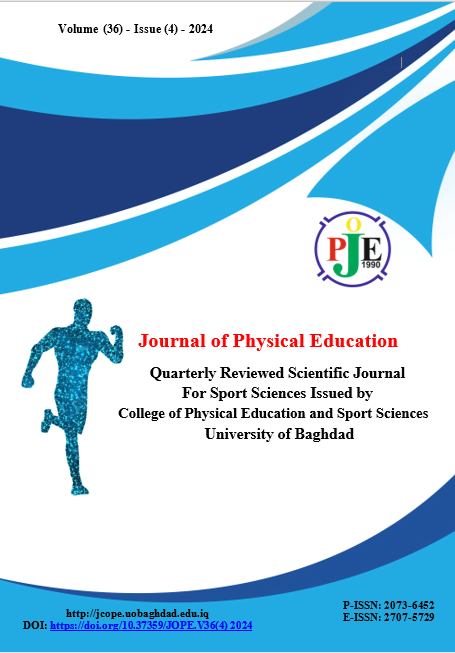The Effect of the (Team - Pair - Solo) Strategy in Learning the Accuracy of the Spiking Skill in Volleyball
DOI:
https://doi.org/10.37359/JOPE.V36(4)2024.2013Keywords:
(team-pair-solo) Strategy, Accuracy of Spiking Skill, VolleyballAbstract
This study aims to prepare educational sessions for the strategy (team-pair-solo) in practical volleyball lessons for female students and identifying its effect on learning the accuracy of the spiking skill in volleyball. An experimental design with experimental and control groups was employed on a purposive sample of (30) female students who were to constitute (42.254%) from their community represented by the sophomores at the College of Physical Education and Sports Sciences for Girls / University of Baghdad who are in good standing in the morning study for the academic year (2022-2023), whose total number is (71) students.
According to the determinants of the experimental design, participants were divided into two equal groups, and the accuracy test of the skill under research was determined, and four educational sessions were prepared that were applied experimentally to the students of the experimental group over four consecutive weeks. One session per unit was presented to participants in the experimental group. Participants in the control group received the conventional learning of the accuracy of this skill.
After the completion of the experimentation, the scores of the pre- and post-tests of the students of these two groups were collected and statistically processed with the statistical package for social sciences. The researchers concluded and recommended that a strategy (team-pair-solo) can be applied in practical physical education lessons to learn the accuracy of the skill performance in volleyball for sophomores at the College of Physical Education and Sports Sciences for Girls. This application helps in learning the accuracy of the spiking skill in volleyball among students and outperforms its learning among students who learn without such a strategy.
It is necessary to pay attention to provide a learning environment that suits the application of a strategy (team-pair-solo) in practical physical education lessons in volleyball, and it is necessary to pay attention to diversifying the combination between cooperative and individual self-learning within one lesson when learning the accuracy of the spiking skill in volleyball among sophomores at the College of Physical Education and Sports Sciences for girls.
References
Adas, Abdul Rahman. (2015). Educational research methodology. (3rd ed.). Cairo. Dar Al-Fikr Al-Arabi.
Al-Azzawi, Saleh Majeed, & Al-Bayati, Basman Abdul Wahab. (2013). Applied artistic gymnastics. Baghdad. Dar Al-Diaa Press.
Al-Mahdi, Majdi Salah. (2019). Educational research methods. Cairo. Dar Al-Fikr Al-Arabi.
Al-Shammari, Mashi Mohammad. (2001). Active learning strategy. Ministry of Education in the Kingdom of Saudi Arabia.
Apio, C. M, Eguia, K. F, Wee, J. H, & Masters, R. S. (2019). Learning through observation and physical practice: How infants learn to reach for objects. Human Movement Science, 63, 1-9.
Aronson, E., & Patnoe, S. (2020). The jigsaw classroom: Building cooperation in the classroom (2nd ed.). Longman.
Attia, Mohsen Ali. (2016). Learning: Modern patterns and models. Amman. Dar Safa for Publishing and Distribution.
Bhanu, S. S. (2015). Understanding movement and learning. Journal of Education and Practice, Kinesthetic learning, 6(13), 144-147.
Biggs, J., & Tang, C. (2017). Teaching for quality learning at university: What the student does (3rd ed.). Open University Press.
Chotimah, ImaChusnul. (2017). The effectiveness of using team pair solo strategy in teachingwriting descriptive text for the second-grade students in SMPN, 2 PETERONGAN SELL Journal Vol. 2(1) February, p:75.
DEL EJERCICIO Y EL DEPORTE. Vol. 18 nº 3 pp. 282-285 ISSN 1886-8576. https://dialnet.unirioja.es/servlet/articulo?codigo=9023737
Haneen Maysam abbass Al-Sade1 *, Najlaa Abbas AL-Zuhairi. The effect of the mobile correspondent strategy on positive thinking and learning the skill of receiving serve among high school students. REVISTA IBEROAMERICANA DE PSICOLOGÍA
Hanin Maisam Abbas, & Najlaa Abbas Nseif. (2023). The impact of the mobile correspondent strategy on social-psychological adjustment and learning the skill of volleyball serving among preparatory stage students. Modern Sport, 22(2), 0065. https://doi.org/10.54702/ms.v22i2.1116
Ismail Adham, S., & Al-Zuhairi, N. A. (2022). Level of professional pressures during the use of e-learning teaching method among teachers of the Faculties of Physical Education and Sports Sciences in Baghdad. SPORT TK-EuroAmerican Journal of Sport Sciences, 11, 52. https://doi.org/10.6018/sportk.526721
Jinan Ghazi Sigar, & Dr. Najlaa Abbas. (2021). The impact of the question network strategy in accordance with mental capacity in the strength of cognitive control in the subject of teaching methods of sports education for undergraduate students. Modern Sport, 20(2), 0001. https://doi.org/10.54702/msj.2021.20.2.0001
Johnson, D. W., & Johnson, R. T. (2019). An educational psychology success story: Social interdependence theory and cooperative learning. Educational researcher, 31(4), 233-247.
Ketchum, D. (2018). Factors affecting effective teaching. Retrieved from https://classroom.synonym.com/factors-affecting-effective-teaching-7959193.html
Malath Haider, & Njlaa Abbas. (2021). Decision-making and its relationship to spiking and blocking performance in volleyball for emerging players. Modern Sport, 20(3), 0035. https://doi.org/10.54702/msj.2021.20.3.0035
Najlaa Abbas. (2020). The effect of using the bubble mental map on learning the skills of preparation and receiving transmissions in female students volleyball. Modern Sport, 19(4), 0049. https://doi.org/10.54702/msj.2020.19.4.0049
Ramsden, P. (2022). Learning to teach in higher education (2nd ed.). Routledge.
Safa Abdul-kareem Sadiq, & Najlaa Abbas Nseif. (2022). The relationship of three-dimensional intelligence to cognitive achievements in the subject of teaching methods. Modern Sport, 21(4), 0001. https://doi.org/10.54702/ms.2022.21.4.0001
Sahab Ismaeel, & Njlaa Abbas Al-Zuhairi. (2022). Analytical study of psychological adjustment for physical education colleges and sports sciences in Baghdad when used by electronic education. Modern Sport, 21(1), 0057. https://doi.org/10.54702/msj.2022.21.1.0057
Samarri, Asma Hikmat. (2002). Building and codifying a measure of scientific knowledge and its relationship to skillful performance in volleyball. PhD Dissertation. College of Physical Education and Sports Sciences, University of Baghdad.
Sanjaya, Dedi and Sumarsih. (2019). Improving The Students’ Achievement on Writing Descriptive Paragraphs Through The Application of Team Pair Solo, available on https://jurnal.unimed.ac.id/2019/ index.php/ellu/article/view/355, accessed on Monday 4th, February.
Sawsan Jawdat, & Najlaa Abbas. (2021). The reality of psychological defense deception among students practicing sports in the faculties of physical education and Sports Sciences/Baghdad University. Modern Sport, 20(4), 0053. https://doi.org/10.54702/msj.2021.20.4.0053
Smith, J. J., Morgan, P. J., Plotnikoff, R. C., Dally, K. A., Salmon, J., & Okely, A. D. (2017). Smart-phone obesity prevention trial for adolescent boys in low-income communities: The ATLAS RCT. Pediatrics, 134(3), e723-e731.
Thi, Train L. (2019). Using Pair and Group Work in Teaching Writing, available on http://www.nzdl.org/gsdl/collect/literatu/index/assoc/HASH6481.dir/doc.pdf , accessed on Thursday 28th, February.
Williams, J. M., & Krane, V. (2019). Applied Sport Psychology: Personal Growth to Peak Performance. McGraw-Hill Education.
Downloads
Published
Issue
Section
License
Copyright (c) 2024 Journal of Physical Education

This work is licensed under a Creative Commons Attribution-NonCommercial 4.0 International License.






 The Journal of Physical Education (JOPE) applies a Creative Commons Attribution 4.0 International license (CC BY 4.0), which lets others distribute, remix, tweak, and build upon your work, even commercially, as long as they credit you for the original creation. For more information, click the link :
The Journal of Physical Education (JOPE) applies a Creative Commons Attribution 4.0 International license (CC BY 4.0), which lets others distribute, remix, tweak, and build upon your work, even commercially, as long as they credit you for the original creation. For more information, click the link : 